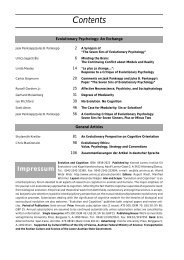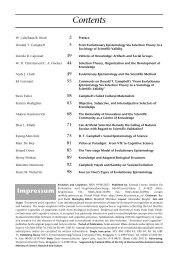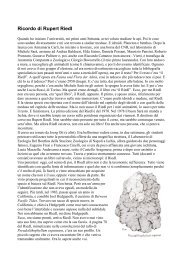Contents - Konrad Lorenz Institute
Contents - Konrad Lorenz Institute
Contents - Konrad Lorenz Institute
Create successful ePaper yourself
Turn your PDF publications into a flip-book with our unique Google optimized e-Paper software.
Was the First Craniate on the Road to Cognition<br />
Partly because our present existence appears to<br />
depend upon a long string of unpredictable accidents,<br />
biologists know of no fundamental “law of<br />
progress” to show them why the path should have<br />
led to anything like Homo sapiens. Biologist C. O.<br />
LOVEJOY writes that “the evolution of cognition is<br />
the product of a variety of influences and preadaptive<br />
capacities, the absence of any one of which<br />
would have completely negated the process”<br />
(LOVEJOY 1981). He notes that the human’s complex<br />
nervous system is actually a reproductive liability,<br />
requiring a longer gestation period and a<br />
longer time to train the young. LOVEJOY concludes:<br />
“It is evident that the evolution of cognition is neither<br />
the result of an evolutionary trend nor an<br />
event of even the lowest calculable probability, but<br />
rather the result of a series of highly specific evolutionary<br />
events whose ultimate cause is traceable to<br />
selection for unrelated factors such as locomotion<br />
and diet” (Ibid).<br />
“If intelligence has such high value”, writes<br />
Ernst MAYR, “why don’t we see more species develop<br />
it” (MAYR 1996). He contrasts the singular<br />
development of high intelligence with the repeated<br />
evolution of sight, which occurred at least<br />
40 times (SALVINI-PLAWEN/MAYR 1977). He calls the<br />
search for extraterrestrial intelligence “hopeless”<br />
and “a waste of time”, concluding that “for all<br />
practical purposes, man is alone” (MAYR 2001,<br />
p263).<br />
The list of leading biologists and paleontologists<br />
on record for defending this intelligence-by-fluke<br />
position is impressive, including SIMPSON,<br />
DOBZHANSKY, FRANCOIS, AYALA, and GOULD (BAR-<br />
ROW/TIPLER 1986, p133). British astronomer John<br />
BARROW and American physicist Frank TIPLER note<br />
that “there has developed a general consensus<br />
among evolutionists that the evolution of intelligent<br />
life, comparable in information-processing<br />
ability to that of Homo sapiens, is so improbable<br />
that it is unlikely to have occurred on any other<br />
planet in the entire visible universe” (Ibid).<br />
Many astronomers who once took optimistic<br />
positions on the probability of finding signals from<br />
an extraterrestrial intelligence are adjusting their<br />
predictions. Forty years of null SETI results may<br />
have even taken their toll on optimist Robert JAS-<br />
TROW, director of the Mt. Wilson Observatory.<br />
Though he once told this writer, “We’ll be hearing<br />
from those guys soon”, he has since modified his<br />
statement to “If life is common, we’ll be hearing<br />
from those guys soon” (JASTROW personal communication).<br />
Even this guarded claim shows an astronomer’s<br />
willingness to believe that the route<br />
from life to intelligence is an obvious one, which,<br />
as we have seen, is disputed by most biologists and<br />
paleontologists schooled in the Modern Synthesis.<br />
Something Missing<br />
Some paleontologists see such strong trends in the<br />
fossil record that they don’t believe contingent<br />
events can overcome them. Jun-Yuan CHEN believes<br />
that there must be other forces driving evolution toward<br />
intelligence besides natural selection and mutations.<br />
If evolution were restricted to these two<br />
forces, he says, then all life would still be microbial.<br />
“Bacteria are very successful”, pointed out CHEN.<br />
“They have a great capacity to adapt to environmental<br />
changes” (personal communication). And he<br />
noted that bacteria have flourished better than other<br />
life forms that have come and gone over billions of<br />
years without complexity or intelligence. Complex<br />
life, CHEN said, is less capable of making adaptations,<br />
so that “complex, highly evolved life, like the human,<br />
has no reason to appear. So why should these<br />
chance mutations plan such complex types of animals”<br />
(Ibid). What’s missing from neo-DARWINISM<br />
Wallace ARTHUR pictures neo-DARWINIAN theory<br />
as a grand edifice with foundations and walls that<br />
are composed of interdependent disciplines, so that<br />
“if one part turns out to be wrong, the whole structure<br />
may eventually collapse” (ARTHUR 1997, p285).<br />
Until the developmental component has made its<br />
contribution, he says, “There is not just a brick or<br />
two missing, but rather a whole section of the building”<br />
(Ibid).<br />
Physicist Paul DAVIES suspects that biologists have<br />
concluded too rashly that they understand life’s origin<br />
and evolution, and that “we are missing something<br />
very fundamental about the whole business”<br />
(DAVIES 1999, p17). Cosmologists routinely use the<br />
term “anthropic principle” to describe the many<br />
preconditions for complex life met by severely constricted<br />
universal constants (BARROW/TIPLER 1986;<br />
BARROW 2002; GREENE 1999). These include the apparent<br />
“fine-tuning” of the universe’s expansion<br />
rate (sometimes calculated to be “tuned” to one part<br />
in 10 60 at one second after the big bang, as a precondition<br />
for life) (HAWKING 1988, pp121–122; KRAUSS<br />
1998) and the precise strengths of nature’s four fundamental<br />
forces (e.g., the strength of the electromagnetic<br />
force appears to be tuned relative to the<br />
gravitational force to at least one part in 10 36 , as a<br />
precondition for the existence of stable stars) (BAR-<br />
ROW/TIPLER 1986, p219; DAVIES 1983, p188; REES<br />
Evolution and Cognition ❘ 151 ❘ 2003, Vol. 9, No. 2








